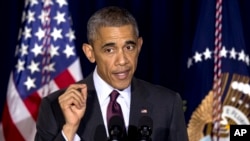President Barack Obama is urging U.S. lawmakers, before they leave for the holiday recess in a few weeks, to pass $6.2 billion in emergency funding to fight the Ebola virus and prepare U.S. hospitals to handle future cases.
Speaking Tuesday at the National Institutes of Health near Washington, Obama said money to battle the disease is running out and that Congress could give a Christmas present to the American people and the world by passing a spending bill.
The president toured NIH laboratories and congratulated researchers on completion of phase 1 clinical trials of a potential vaccine to treat Ebola, which clears the way for it to go to clinical trials in West Africa. He called it "exciting news" that a potential vaccine produced no serious side effects during first-phase testing, noting that no other potential Ebola drug had progressed this far to date.
However, Obama stressed that there was no guarantee the vaccine would work and that the fight was not close to being over, even if media attention had shifted to other issues. He noted the outbreak has gotten worse in countries like Sierra Leone, where infections and the death toll have risen in recent weeks.
“Every hotspot is an ember that, if not contained, can become a new fire. So we cannot let down our guard even for a minute,” he said.
"If we are going to actually solve it for ourselves, we have to solve it in West Africa as well,” he added.
Contingency funds
Most of Obama's request is aimed at the immediate response to the disease at home and abroad. But the package also includes $1.5 billion in contingency funds — money that could become a target if lawmakers decided to trim the bill.
"That is the part of the package that is most at risk," said Sam Worthington, president of InterAction, an alliance of U.S. nongovernmental aid groups.
While lawmakers recognize that the United States has to take action to arrest the deadly disease, some are wary of giving the administration leeway in investing money in public health systems in West Africa.
"I think there is less understanding of the need to stay in it for the long run and to build the capacity of countries to ensure this doesn't happen in the future," Worthington said.
In its overseas response, the United States has scaled up deployment of American personnel in West Africa — with 200 civilians and 3,000 service members on the ground.
At the NIH, Obama said efforts to battle Ebola at its source are showing results, particularly in Liberia, where the U.S. has built three of 10 planned Ebola treatment units, and the number of beds for Ebola patients is expected to reach 2,000 by early next year.
“We’ve ramped up the capacity to train hundreds of new health workers per week," Obama said. "We have improved burial practices across Liberia. And as a consequence, we have seen some encouraging news — a decline in infection rates in Liberia.”
Ebola has killed about 6,000 people in Guinea, Liberia and Sierra Leone, along with a handful of people in other countries.
The Obama administration came under fire in September after a series of protocol missteps involving an Ebola patient who traveled to Dallas from Liberia and later died. Two nurses contracted the disease while caring for the man.
The president also touted progress in the U.S. fight against the disease, saying the number of American hospitals prepared to deal with Ebola has increased from just three facilities to 35 nationwide in the last two months, and the number of laboratories testing for Ebola has increased from 13 to 42 since August.
Screening and treatment procedures have since been tightened, and there are no current U.S. cases.
"My hope is that we're not getting Ebola fatigue setting in," said Bruce Johnson, president of SIM USA, a Christian missionary group that helps treat Ebola patients in Liberia. "There continues to be a huge need for this funding."
Some information for this report came from Reuters.




